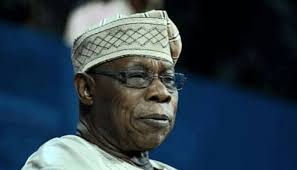Obasanjo Blasts NNPCL: 'Disrespectful Invitation Over Refineries Is an Insult to My Office
Obasanjo Blasts NNPCL: 'Disrespectful Invitation Over Refineries Is an Insult to My Office
By Achimi Muktar
Former President Olusegun Obasanjo has strongly criticized the Nigerian National Petroleum Corporation Limited (NNPCL) for inviting him to tour the nation’s refineries via a public statement, labeling the move as a blatant display of disrespect.
The NNPCL Invitation
The controversy began after the NNPCL, through its spokesperson Olufemi Soneye, extended an open invitation to Obasanjo for a tour of the rehabilitated Port Harcourt and Warri refineries. This came in response to the former president’s remarks during a Channels Television interview, where he recounted his unsuccessful efforts to privatize Nigeria’s oil refineries during his administration.
Obasanjo criticized the refineries’ long-standing inefficiency and lamented that despite billions of dollars spent on repairs since 2007, the facilities remain non-functional.
A Missed Opportunity
Obasanjo revealed that during his presidency, billionaire industrialist Aliko Dangote offered $750 million to manage the Port Harcourt and Kaduna refineries through a Public-Private Partnership (PPP). However, his successor, the late President Umaru Musa Yar’Adua, rejected the deal, trusting the NNPC to run the refineries—a decision Obasanjo labeled a grave mistake.
“When I was president, I asked Shell to manage the refineries, but they declined. Dangote assembled a team and paid $750 million to participate in a PPP, yet the money was refunded because NNPC claimed it could handle the refineries. That decision cost Nigeria dearly,” Obasanjo said.
He noted that over $2 billion had been spent on refinery rehabilitation since then, with no tangible results.
The NNPCL Response
In defense, NNPCL spokesperson Femi Soneye stated that the refineries were operational following comprehensive rehabilitation efforts. He invited Obasanjo to witness the improvements firsthand.
“We extend an open invitation to former President Obasanjo to tour the rehabilitated refineries and see the progress made under the new NNPCL,” Soneye said.
Obasanjo Fires Back
The former president dismissed the invitation as an insult to his office and legacy. Speaking through his media aide, Kehinde Akinyemi, Obasanjo questioned the manner of the invitation, asserting that no formal communication was made.
“Is that the right way to invite a former president? Baba has not even seen the statement or read the news. It is a total disrespect for his office. The NNPCL has not written an official letter inviting him,” Akinyemi stated.
Skepticism Over Refineries’ Status
Obasanjo’s concerns resonate with many Nigerians who remain doubtful about the refineries’ operational status. Recent investigations by Saturday PUNCH revealed inconsistencies in the NNPCL’s claims:
Despite announcing that the Port Harcourt refinery began crude oil processing on November 26, visits to the site showed no significant activity.
Workers reported that the facility was undergoing calibration, delaying operations.
Subsequent visits revealed further inactivity at both the Port Harcourt and Warri refineries.
Support from Key Stakeholders
Prominent groups and political leaders have rallied behind Obasanjo, condemning the NNPCL’s approach.
Chief Sola Ebiseni, Secretary-General of Afenifere, described the invitation as “sheer arrogance.”
“Obasanjo’s comments highlight decades of mismanagement. Instead of addressing the issues, NNPCL resorts to disrespectful politics. A statesman of Obasanjo’s stature deserves a formal courtesy visit, not public ridicule,” Ebiseni said.
Similarly, Chief Peter Ameh, National Secretary of the Coalition of United Political Parties (CUPP), called the move an “utter disrespect” for Obasanjo’s legacy.
“You cannot invite someone of Obasanjo’s caliber via newspapers. This reflects NNPCL’s failure to separate politics from governance, which continues to harm Nigeria’s economy,” Ameh stated.
The Bigger Picture
Obasanjo reiterated that private-sector management remains the key to revitalizing Nigeria’s refineries. He contrasted the government’s inefficiency with Dangote’s success in building a privately owned refinery capable of meeting Nigeria’s needs.
While the NNPCL insists that its rehabilitation efforts are yielding results, critics argue that decades of mismanagement have eroded public trust. For many Nigerians, the question remains: Will the refineries ever truly work, or is this just another costly illusion?



















